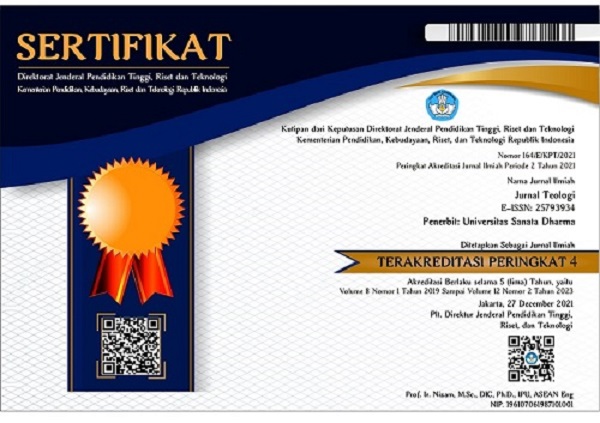Diocesan Bishop and Temporal Goods of the Church
(1) Doctoral Student of the University of Santo Tomas Manila, Philippines
(*) Corresponding Author
Abstract
Keywords
Full Text:
PDFReferences
Beal, John P. Ordinary, Extraordinary and Something in between: Administration of the Temporal Goods of Dioceses and Parishes. The Jurist 72 (2012): 109-129.
Caparros, E. et al. (eds.), Code of Canon Law Annotated. Montral: Wilson & Lafleur Limite Woodridge: Midwest Theological Forum, 2004.
F. Testera, Ecclesiastical Financial Management. dalam Selected Readings in Canon Law 1, ed. Jose Maria B. Tinoko, 137-152. Philippines: Santo Tomas University Press, 1989.
Green, Thomas J. The 2004 Directory on the Ministry of Bishops: Reflection on Episcopal Governance in A Time of Crisis. Studia Canonica 41 ( ): 117-151.
Green, Thomas J. Shepherding the Patrimony of the Poor: Diocesan and Parish Structures of Financial Administration. The Jurist 56 (1997): 706-734.
Kennedy, Robert T. Book V: Temporal Goods of the Church. dalam New Commentary on the Code of Canon Law, eds. J.P. Beal et al, 1451-1525. Bangalore: Theological Publications in India, 2003.
Liku-Ada, John. Statuta Keuskupan Agung Makassar. Indonesia: Keuskupan Agung Makassar, 2001.
Medroso, Leonardo Y. Administration of Temporal Goods of the Church and Transparency. dalam Philippine Canonical Forum 6 (2004): 241-246.
Morrisey, Fancis G., Ordinary and Extraordinary Administration: Canon 1277. The Jurist 48 (1988): 709-726.
Renken, John Antony, Contracts Threatening Stable Patrimony: the Discipline and Application of Canon 1295, dalam Studia Canonica 45 (2011): 501-519.
Roche, Garret J., The Poor and Temporal Goods in Book V of the Code. dalam The Jurist 55 (1995): 299-348.
Walkowiak, David J. Chapter Sixteen: Ordinary and Extraordinary Administration. dalam Church Finance Handbook, eds. Kevin E. Mckenna et al., 185-206. Washington D.C.: Canon Law Society of America, 1999.
DOI: https://doi.org/10.24071/jt.v7i2.1090
Refbacks
- There are currently no refbacks.

This work is licensed under a Creative Commons Attribution-ShareAlike 4.0 International License.
.jpg)
Indexed and abstracted in:
P-ISSN: 2302 - 5476 (Validity starting Volume 2012-10-05)
E-ISSN: 2579 - 3934 (Validity starting Volume 6, No. 1, Mei 2017)
Jurnal Teologi (Journal of Theology) by Faculty of Theology Sanata Dharma University

This work is licensed under a Creative Commons Attribution-ShareAlike 4.0 International License.














